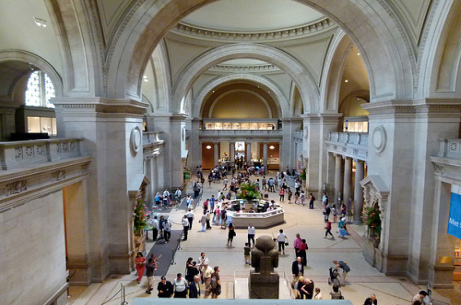
Gates Cambridge alumna Galina Mardilovich has curated part of an exhibition on Russian printmaking at the prestigious Metropolitan Museum of Art.
A Gates Cambridge alumna has curated part of an exhibition on Russian printmaking at the prestigious Metropolitan Museum of Art.
Galina Mardilovich [2008] has been the Jane and Morgan Whitney pre-doctoral Fellow in the Department of Drawings and Prints at the Metropolitan Museum in New York over the past year while finishing her doctoral dissertation, “Printmaking in Late Imperial Russia”.
As a fellow, she has studied Western influences on Russian printmaking, and for the Department’s Drawings and Prints: Selections from the Permanent Collection exhibition which runs until November 18, she wanted to showcase some of these connections. She curated two displays: one focuses on the “etching revival” of the second half of the nineteenth century and the other covers the increasing use of colour in printed material at the turn of the twentieth century, specifically highlighting its use in children’s imagery.
Both of these themes stem directly from her dissertation. Galina, who did a PhD in the History of Art at the University of Cambridge with the support of a Gates Cambridge Scholarship, says: “It was really rewarding to be able to feature some of the rarely-seen prints, drawings, and books on the walls and stands of the Met. It was particularly exciting to position Russian developments in these media within a broader European context. Generally the curators of the department are responsible for choosing the exhibition’s themes, but this time, two curators, two other fellows and I selected the works. It was my first time doing so, and it was a pleasure to deliberate on which works to use, to consider their presentation, and to communicate ideas to the public through labels.”
The exhibition is part of the Department of Drawings and Prints’ gallery rotations. Because of the nature of the collection – works on paper are very fragile and sensitive to light – the works cannot be exhibited for long periods of time.
As such, the department rotates the display every three months, which also enables it to present the variety and vastness of the holdings.
Picture credit: Creative Commons and Esoteric_Desi.












